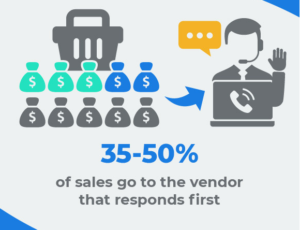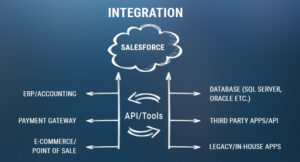How Can Salesforce Help Simplify Sales Operations?
Sales operations encompass several key roles within the sales organization, including strategy, data analysis, hiring and training, forecasting, territory design, and sales process optimization. Sales ops are often the unsung hero of the organization, handling the most difficult activities and challenges in order to drive effective selling, accurate forecasting, strong sales strategy and even compensation in many cases.
At the same time, sales operations in every industry are becoming increasingly complex as technology advances and the many moving parts and people involved in the sales process are more connected. Real-time updates and responses are more important than ever. In fact, 35-50% of sales go to the vendor that responds first.
Employing CRM software can significantly increase a company’s ability to effectively manage sales operations while addressing challenges and identifying opportunities more quickly, ultimately increasing sales and revenue. Salesforce, the world’s leading sales management CRM, offers key features and capabilities that help companies accomplish this.
Let’s take a closer look at 4 specific ways Salesforce can help simplify sales operations.
4 Ways Salesforce Can Help Sales Operations
We’ll explore this by topic by looking at it through a maturity lens, starting first with foundational benefits and increasing in sophistication. This shows the comprehensive ways in which Salesforce can help sales operations at all levels and areas of an organization.
The Basics
Even companies that start out with clearly defined and communicated sales processes often find themselves struggling with continual deviations, inefficiencies, and breaks in the process. This happens often because sales reps aim to establish themselves as top performers and will implement their own tactics and strategies to accomplish this goal.
Sales organizations and leaders are tasked with the challenge of maintaining the touch balance between encouraging healthy competition among sales teams while ensuring reps adhere to established processes and best practices. In this way, a CRM system like Salesforce can help by continually reinforcing foundational principles and core standards of your company’s process.
Here are some specific ways Salesforce can do this:
- Sales paths guide your sales users and keep them focused on the right tasks and processes.
- Process automation tools like Salesforce Flow allows you to build blows and edit current processes to optimize operations, increase efficiency, and keep things running smoothly.
- Simple and meaningful dashboards that are fully customizable allow for data insights and visualization that support data-driven decision making and action.
- Content libraries provide a place to store and share important documents like PDF guides, Excel reports, and video and image files.
- Chatter groups enable collaboration between team members through posts, comments, and file sharing.
The key to success here is developing well-defined sales motions, enabling them in Salesforce and then training, reinforcing, and managing those motions consistently.
Enhance and Streamline
As processes and standards are continually reinforced in Salesforce, the platform can streamline complexities and optimize functions in ways that are difficult or even impossible to do manually without a CRM system. AppExchange apps have a diverse set of capabilities to this, such as CPQ to drive efficient quoting, High Velocity Sales to automate consistent call and email cadences, Contract Lifestyle Management to streamline sales proposals and many more.
For a real-world idea of how AppExchange can be optimally leveraged, check out how the University of Colorado transformed experiences with apps:
Integrate Systems
Sales operations include a number of systems and data sets from various sources that all work together to make the sales process work. Salesforce can integrate with the systems your company is already using to create more streamlined processes and give sales teams a more holistic view.
For example, Salesforce can integrate with ERP or accounting systems to give reps better visibility into inventory, overdue invoices, and order histories. Solutions like Salesforce CPQ or Zuora can enhance reps’ ability to present and close deals or to modify current subscriptions. Tying Salesforce into license management systems allows reps to offer software trials.
Integrating data sets from systems working together throughout the sales process can glean better insights for sales teams, drive more informed action, and create opportunities for better decision making.
Power Data-Driven Strategies
Einstein Analytics, available exclusively on Salesforce Lightning, is a data analytics and visualization app that allows sales teams to see and understand sales data coming from different sources. With Einstein Analytics, sales reps and management can gain more sophisticated insights, improve forecast accuracy, identify upsell opportunities, and spot weak adoption in time to avoid attrition or nonrenewals.
This quicker and more comprehensive view of business developments and key actions on the part of prospects and customers can improve relationships between your sales team and clients. It can also drive ownership on the part of sales reps who now have an all-encompassing, data-driven view of their deals that leaves little room for delayed or missed action. In the end, this higher accountability on the part of sales teams can lead to more closed deals.
Optimize Your Sales Operations with Salesforce
The unique advantage of Salesforce is that it does not require letting go of the systems and applications that are already working for you. Instead, Salesforce integrates with those systems and apps to enhance the value they offer your organization and empower your sales teams to be more proactive and make smarter decisions.
If you’re ready to optimize your sales operations with Salesforce, contact Rainmaker today to learn about how our solutions can help!








